The HSM-as-a-Service Market is estimated to be valued at USD 0.7 billion in 2025 and is projected to reach USD 2.6 billion by 2035, registering a compound annual growth rate (CAGR) of 14.7% over the forecast period.
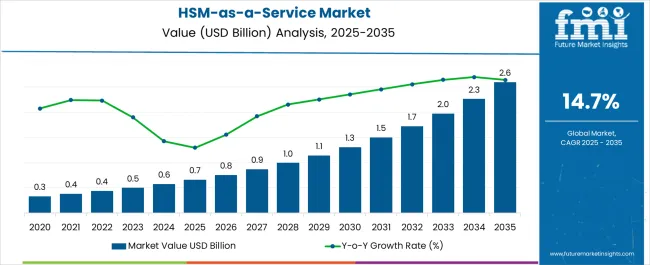
| Metric | Value |
|---|---|
| HSM-as-a-Service Market Estimated Value in (2025 E) | USD 0.7 billion |
| HSM-as-a-Service Market Forecast Value in (2035 F) | USD 2.6 billion |
| Forecast CAGR (2025 to 2035) | 14.7% |
The HSM-as-a-Service market is advancing steadily, driven by the accelerating adoption of cloud-based security solutions and the rising complexity of regulatory compliance requirements. Enterprises are increasingly leveraging hardware security modules (HSMs) delivered as a service to safeguard cryptographic keys, ensure data privacy, and support digital transformation initiatives. Press releases and industry briefings from cybersecurity providers have emphasized the growing demand for scalable, cost-effective, and high-assurance key management services across diverse industries.
The shift towards hybrid and multi-cloud environments has heightened the need for flexible and interoperable HSM solutions that integrate seamlessly into existing IT infrastructures. Additionally, heightened cyber threats, expansion of digital payment ecosystems, and stricter data sovereignty regulations have reinforced enterprise reliance on HSM-as-a-Service.
Looking ahead, the market is expected to benefit from innovations in quantum-safe cryptography, strategic partnerships between cloud providers and cybersecurity firms, and increased adoption across sectors such as BFSI, healthcare, and government organizations.
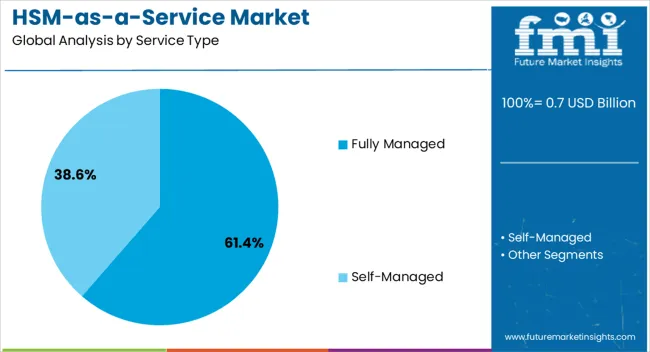
The Fully Managed segment is projected to hold 61.4% of the HSM-as-a-Service market revenue in 2025, securing its position as the leading service model. Growth in this segment has been driven by the increasing enterprise preference for outsourcing complex cryptographic management to specialized providers. Fully managed services have been adopted due to their ability to deliver end-to-end key lifecycle management, compliance reporting, and continuous monitoring without requiring in-house expertise.
Cybersecurity industry updates have noted that organizations are prioritizing managed solutions to reduce operational complexity and ensure adherence to evolving data protection regulations. The segment has also benefited from the scalability and resilience of cloud-native architectures, which provide rapid deployment and high availability.
As digital ecosystems expand, the Fully Managed segment is expected to remain dominant due to its combination of security assurance, operational efficiency, and regulatory compliance support.
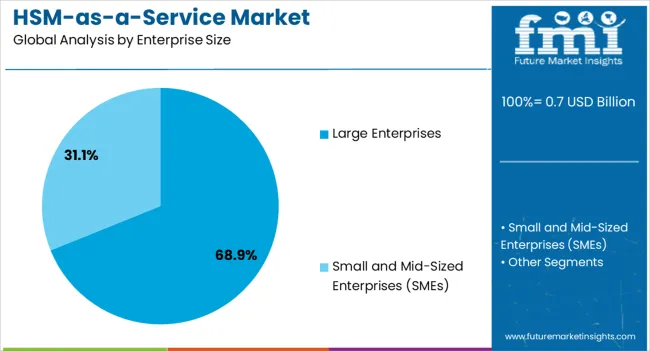
The Large Enterprises segment is projected to account for 68.9% of the HSM-as-a-Service market revenue in 2025, reflecting its significant demand base. Large organizations, particularly those operating in highly regulated industries, have adopted HSM-as-a-Service to secure sensitive customer data, financial transactions, and intellectual property. Corporate disclosures and analyst briefings have indicated that large enterprises allocate higher budgets to cybersecurity, enabling the adoption of robust, scalable HSM solutions integrated into global IT infrastructures.
The complexity of managing cryptographic keys across distributed operations and cloud environments has reinforced the reliance on advanced services. Furthermore, regulatory audits and compliance obligations, such as PCI DSS and GDPR, have further compelled large enterprises to implement secure and auditable cryptographic practices.
As data volumes and transaction complexities continue to rise, large enterprises are expected to sustain their leadership in market adoption, driven by both security imperatives and compliance mandates.
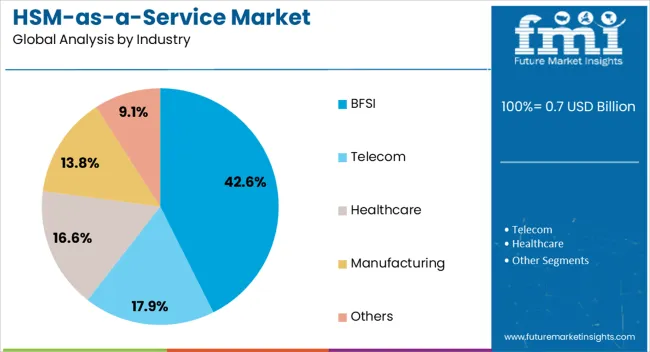
The BFSI segment is projected to contribute 42.6% of the HSM-as-a-Service market revenue in 2025, maintaining its position as the leading industry vertical. This dominance has been shaped by the critical need to secure financial transactions, protect customer data, and comply with stringent financial regulations. Financial institutions have prioritized HSM-as-a-Service due to its role in securing payment systems, enabling digital signatures, and safeguarding encryption keys used in online and mobile banking.
Industry reports and financial security forums have underscored the sector’s reliance on high-assurance cryptographic services to address fraud risks and cyberattacks. Additionally, the ongoing digitization of banking services and rapid adoption of real-time payment systems have amplified the need for scalable and resilient HSM solutions.
With regulatory frameworks continuously tightening and financial ecosystems expanding globally, the BFSI segment is expected to remain the largest adopter, driving consistent demand for HSM-as-a-Service offerings.
The HSM-as-a-service market is expected to grow at 14.3% CAGR between 2025 and 2035, in comparison with the 12.1% CAGR registered from 2020 to 2025. Users of HSM-as-a-service can create encryption keys and utilize and store them safely without worrying about time-consuming tasks like evaluating, configuring, maintaining, and updating their own HSM.
HSM-as-a-service provides consumers with a highly useful additional layer of security for storing and managing data encryption keys, doing away with the requirement of on-premises hardware devices.
The service is a general-purpose key vault that may be applied to numerous use cases. Users can easily handle a wide range of sophisticated use cases from the cloud by employing HSM-as-a-service.
Various key players focus on launching cutting-edge services equipped with multiple features to attract more worldwide consumers. In June 2025, for instance, Thales announced that it is helping NAVER Cloud to introduce the first Korean sovereign cloud, HSM as a service.
It is powered by the Luna Network Hardware Security Module of Thales. The new service may enable companies to meet the stringent industry and regulatory mandates for controlling their encryption and data.
Surging Adoption of User-friendly Interfaces
The global market is growing rapidly due to the rising demand for information and data security, as well as the wide technical change that increased acceptance of cutting-edge IoT and cloud computing technologies.
Due to the rising adoption of a user-friendly interface to incorporate a blockchain transaction security system for clients, the market is anticipated to exhibit significant growth.
The rapidly expanding requirement for the administration of cryptographic keys is anticipated to fuel market expansion. Future-proofing the hardware protection module with effective and specialized solutions that take changing customer needs into account can be a crucial requirement.
Risks of Data Exposure May Hinder Sales of Cloud-based HSM
When a business, program, or other organization mistakenly exposes sensitive data, it gives out personal information of clients, employees, and consumers. When a database where the information is stored is not adequately protected, sensitive data may be exposed.
This could happen for several reasons, such as when the data is accidentally uploaded to the wrong database or when there is inadequate or no encryption. This factor is expected to hamper the market in the next decade.
Due to the growing need for data protection, France may soon experience a rise in demand for HSM services. Organizations across the country use HSM for key management, encryption, and decryption.
The solution has developed into a crucial element of a company's encryption and key management strategy. Since this deployment method has become more feasible and cost-effective, especially among mid-sized and small enterprises, the majority of businesses in France are likewise heading in that direction.
Besides, the presence of many renowned companies in France is likely to boost growth. In May 2020, Atos, a French multinational IT services firm, introduced a new hardware security module for IoT systems and a quantum simulator.
The new product is a part of the company's Horus portfolio and may be available for applications running in software-as-a-service mode. Owing to the above-mentioned factors, sales in France are predicted to expand at the highest CAGR of 13.7% during the forecast period.
Expansion of the Retail Banking Sector in the United Kingdom to Push Demand for HSM Hosting Platforms
Strong security and fraud prevention technologies are becoming more crucial in the United Kingdom as businesses transition to the digital age. The retail banking sector handles the personal information and financial data of many customers daily; hence, sophisticated security measures are needed to safeguard this sensitive data. According to FMI, the United Kingdom held about 17.9% of the Europe market share in 2024.
To protect information cryptographically, retail banks across the country are boosting their investments in HSM services. They are shielding businesses from security flaws while enabling customers to execute transactions securely using their preferred payment method. As a result, the market for hardware security modules in the United Kingdom is experiencing increased demand due to the growth in retail banking.
As per the United Kingdom Finance report, in 2024, unauthorized financial fraud losses across checks, remote banking, and payment cards totaled £0.3 million across Europe, which is a decrease of about 5%, as compared to 2020. Thus, the need for innovative HSM services to protect crucial financial information in banks is set to drive the United Kingdom market.
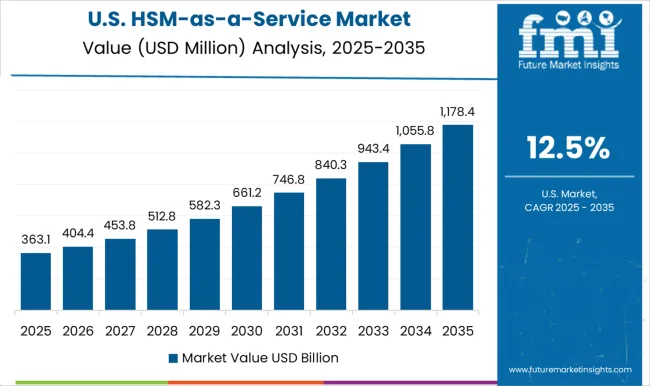
Pharmaceutical Industry in the United States to Use HSM Cloud Service for Cutting Shipping Cost
Demand for hardware security modules in the United States is anticipated to increase at a CAGR of 8.2% from 2025 to 2035, finds FMI. The presence of key manufacturers of hardware security modules like Entrust Corporation and IBM in the country is set to drive growth. These market participants are concentrating on new product launches to strengthen their positions.
For instance, Entrust Corporation announced the geographic expansion of its hardware security module service called nShield as a Service in December 2024. The business established two new data centers in Australia in response to the growing demand for cloud-based HSM services.
HSMs' code and document signing applications are helping pharmaceutical companies to cut costs on shipping and medication development. These factors are expected to help the market to grow in the United States.
Fully Managed HSM Services to Gain Impetus in the Global Market
Business applications such as TLS/SSL encryption key protection, public key infrastructures (PKIs), code signing, digital signature, and blockchain use fully managed HSM services as the root of trust.
Fully managed HSM services may continue to initiate crucial security measures like device authentication by using digital certificates as the Internet of Things develops and increases the demand for device IDs and certificates.
This service also supports the most popular operating systems and APIs in the market, as well as a wide variety of cryptographic methods, such as elliptic-curve cryptography techniques that allow for high-speed transactions perfectly suited to today's computing environments. As a result, the fully managed HSM service segment accounted for 54.5% of the market share in 2024.
Healthcare Industry to Utilize HSM Networking to Minimize Paperwork
Pharmaceutical companies are required to adhere to stringent security and privacy regulations while producing new medications. Additionally, these businesses are routinely audited.
A cloud-based HSM service enables pharmaceutical businesses to minimize paperwork, transfer documents effortlessly, automate document handling, and record regulatory-compliant signatures on portable devices like tablets and smartphones in the case of remote secure access.
Pharmaceutical firms benefit from significant shipping cost savings, accelerated time to market, and faster development of new products with the help of cloud signing solutions. On the back of these factors, the healthcare segment is anticipated to record a CAGR of 17.8% from 2025 to 2035.
SMEs are Looking for Cloud-based HSM to Secure Crucial Data
Small and medium businesses have used hardware security modules for a long time to provide security functions throughout the firm. An extensive range of HSM functions is currently maintained and used for the security of data assets, including hosted data operations, authentication, and encryption key management.
A top priority is to create an encryption key management and maintenance plan, especially if small and medium businesses want to keep HSMs operating at peak efficiency throughout the duration of each encryption certificate.
To fully actualize secure techniques for data security, managing encryption keys over private and public networks and hybrid mixes of physical and cloud-based HSM functions is required. As per FMI, the small and mid-sized enterprises (SMEs) segment is expected to grow at a CAGR of 14.7% from 2025 to 2035.
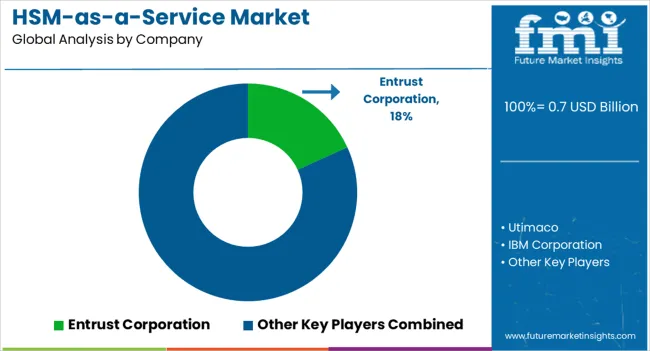
Leading vendors in the global HSM-as-a-service market are introducing new products and increasing their services in emerging nations to provide improved technology and new and upgraded solutions. These vendors are focusing on improving vendor productivity and product quality by employing this method.
Entrust Corporation, Utimaco, and Fortanix - The Three Musketeers of HSM-as-a-Service
Entrust Corporation, Utimaco, and Fortanix are the top three players in the field of HSM-as-a-service. Entrust Corporation enables clients to smoothly migrate from their on-premises nShield HSM estate to nShield as a Service through its Entrust Cloud Concierge service.
The company’s Professional Services team organizes and carries out the seamless migration of the current keys, customers, and applications.
In December 2024, Entrust expanded its nShield as a Service hardware security module with new data centers located in Europe. It is also planning to expand in the Asia Pacific region.
Entrust nShield as a Service may help customers take advantage of nShield cloud HSM and geo-fence their significant cryptographic keys within their jurisdictions to facilitate compliance with regional data protection norms and address various concerns related to data sovereignty.
Entrust offers proactive solutions that assist businesses in complying with legal and regulatory obligations all over the world. The company has also created safe online experiences using SSL technology and protected devices & networks using the authentication product suite.
Utimaco, on the other hand, has emerged as a leading provider of HSM-as-a-service. The company's devices have been securing private and sensitive data against theft and misuse while defending people worldwide against terrorism and crime.
Utimaco's main product lines are hardware security modules and lawful interception management system solutions. To address the difficulty of keeping crypto a secret, the company offers solutions for safe key management and centralized HSM administration and monitoring.
The company's solutions provide a single point of contact for centralized, transparent monitoring, control, and administration. They also have audit logs to help with the attestation. It protects clients against unforeseen outages through a collection of HSMs placed in geographically distinct data centers and offers 99.999% availability.
Fortanix is another reputed name in the space of HSM. To protect sensitive data in public, private, hybrid, or multi-cloud environments, Fortanix Data Security Manager SaaS (DSM SaaS) is an integrated data security as a service that provides secure key management and cryptography services, including cloud key management, secret management, and tokenization.
The service is entirely administered remotely, without the need for physical access. It can be accessed online and is launched with a single click in a matter of minutes.
| Attribute | Details |
|---|---|
| Estimated Market Size (2025) | USD 500.6 million |
| Projected Market Valuation (2035) | USD 1978.6 million |
| Value-based CAGR (2025 to 2035) | 14.7% |
| Forecast Period | 2025 to 2035 |
| Historical Data Available for | 2020 to 2025 |
| Market Analysis | Value (USD million) |
| Key Regions Covered | North America; Latin America; Europe; East Asia; South Asia & Pacific; and the Middle East & Africa |
| Key Countries Covered | United States, Canada, Germany, United Kingdom, France, Italy, Spain, Russia, China, Japan, South Korea, India, Australia & New Zealand, GCC Countries, Turkey, and South Africa |
| Key Segments Covered | Service Type, Enterprise Size, Industry, and Region |
| Key Companies Profiled | Entrust Corporation; Utimaco; IBM Corporation; Thales; Futures; Fortanix; Atos; Security; Ultra Electronics; Yubico; Syprus Inc.; Kryptos; Nitrokey; Adweb Technologies; Sansec |
| Report Coverage | Market Forecast, Company Share Analysis, Competition Intelligence, Drivers, Restraints, Opportunities and Threats Analysis, Market Dynamics and Challenges, and Strategic Growth Initiatives |
The global HSM-as-a-service market is estimated to be valued at USD 0.7 billion in 2025.
The market size for the HSM-as-a-service market is projected to reach USD 2.6 billion by 2035.
The HSM-as-a-service market is expected to grow at a 14.7% CAGR between 2025 and 2035.
The key product types in HSM-as-a-service market are fully managed and self-managed.
In terms of enterprise size, large enterprises segment to command 68.9% share in the HSM-as-a-service market in 2025.






Full Research Suite comprises of:
Market outlook & trends analysis
Interviews & case studies
Strategic recommendations
Vendor profiles & capabilities analysis
5-year forecasts
8 regions and 60+ country-level data splits
Market segment data splits
12 months of continuous data updates
DELIVERED AS:
PDF EXCEL ONLINE

Thank you!
You will receive an email from our Business Development Manager. Please be sure to check your SPAM/JUNK folder too.
Chat With
MaRIA